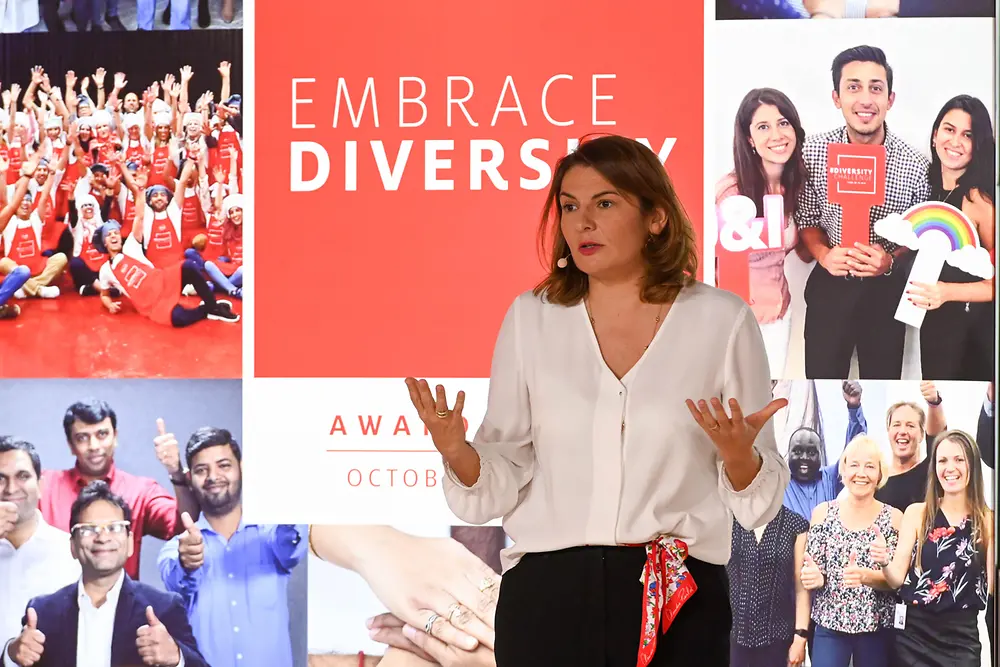Discover the brands and technologies from our business units Henkel Adhesive Technologies and Henkel Consumer Brands.
Reinforcing diversity with clear and measurable targets

Everyone knows that diverse teams, consisting of people with a wide range of experiences, skills, nationalities and genders, are a key factor for success. This is not a new idea, and yet the implementation is challenging and not easy. One topic in particular is close to my heart: women and their career opportunities. We have many excellent, highly qualified female employees at Henkel, so why do we not have a higher proportion of women in top management positions? Is there a glass ceiling in place also at our organization?
I have long wondered why this is and how we could change it. I have found one of the reasons also with myself, as I unfortunately have to admit. I have always thought: “We have so many highly qualified female employees who are keen to take more responsibilities – things will surely sort themselves out.” I now know that this is not the case. To allow us to drive our company forward in terms of diversity, we instead need substantial and measurable targets. But that alone is not enough – we also need systematic and sustainable planning on how to achieve these targets consistently and rapidly. Be it in our recruitment processes by defining a clear percentage of women as final top candidates, at an early stage in career planning of our female colleagues or in our succession planning. This is not just an issue for companies – it is still a general topic in society. Everyone needs to get involved for this to improve.
For example, I have observed during my professional career that men and women often have different strategies in how they work, tackle tasks and express their ambitions, and that their behaviors are diverse as well. It is important that we all respect and value without prejudice that there are many paths to success – and that this kind of diversity can result in even better solutions.

“Ideas come from difference and diversity.”
There is another topic that is important to me: I do not hold to the argument that women lose interest in their careers once they have children and stay at home to look after them. This is absolutely not true for everybody. Rather, I suspect that this is merely an argument or an excuse for us not changing anything and keeping everything as it is.
So how do we tackle this?
Both as a company and as a leadership team, we have the task to define clear targets and create the right framework and culture. For example, we need to allow mothers (and fathers, of course!) some flexibility in terms of their working conditions.
Getting back to the topic of career opportunities: One thing we have to do is determine that a relevant percentage of new appointments will go to women in succession planning. We are working closely together with the Laundry & Home Care leaders and the Human Resources team to make this possible. Of course, this cannot be accomplished overnight – we have to keep working on it. We must make sure that the prerequisites for equal opportunities are in place right from the very start. We must also work to change our own thinking and eliminate any unconscious biases about gender roles that are still lingering on. It is essential for us now to combine our knowledge, put clear frameworks in place and, above all, ensure consistency in implementing them. This must not be a one-off and must not be merely lip service – we must establish a solid and lasting process. The benefits of a diverse company will then be passed on to our consumers – especially to our high number of female consumers – which is also of utmost importance to us.

If we all invest our commitment and a willingness to change, we can benefit from our enriching diversity both as a company and as individuals.
Bruno Piacenza, Member of Henkel Management Board and Executive Vice President Laundry & Home Care
Our company is a source for a whole host of examples of how this can work: one of the role models in this regard is my Board Colleague Sylvie Nicol. She has proven once more that women can have outstanding careers within Henkel. But just imagine, even today, I still occasionally hear the phrase “despite three children”. It is precisely this kind of thinking that shows that we have not yet achieved our goals regarding women and diversity. No one asks men how they manage to do what they do despite having a family.
With interdisciplinary teamwork to a diverse company culture
I am pleased that our collaboration with HR on this topic has already achieved some success over the past few years. It used to be that we only had one woman in our Laundry & Home Care Executive Committee. Now there are three: Núria Ribe, who is responsible for our Home Care business, Marie-Laure Marduel, who is our Head of HR, and Birgit Rechberger, responsible for our Laundry & Home Care business in Europe. We have also appointed women in other key positions in recent years – particularly in areas where men are often highly overrepresented. For example, we now have women in General Manager positions in China, Italy and Lebanon, and others in the roles of sales managers and plant managers. These are just a few positive examples demonstrating that our implemented measures like mentoring are effective and that we must continue striving to promote women in all areas, including in areas traditionally dominated by men.
We also need to constantly assess and reassess the way we think and act and remind ourselves that career success should never be dependent on gender. Sylvie, Birgit and the other female executives are evidence of this. They all have my complete support on this topic. No matter what aspect of diversity is at stake, including when it comes to defining clear goals. BUT: It is up to all of us in Laundry & Home Care as well as Henkel to drive an inclusive company culture that enables diversity.
The following proves true again and again: We have to invest at the beginning – not just in the environment at the organization, but also in increased understanding of different nationalities, cultural backgrounds, ages, experiences and perspectives. It is, of course, easier to form a team if everyone in it comes from the same background and has very similar attitudes and ways of thinking.
That is why it’s worthwhile to choose this path, even if it is sometimes more difficult at the start, and why it’s worthwhile to take the time to develop a mutual understanding and to invest and make the most of everyone’s various strengths. For example, we need the different perspectives and approaches of men and women in the company because we develop products for both male and female consumers. Or for instance, having employees from developing markets outside of Europe will help us working in those markets with much more promising results.
Promoting diversity is worthwhile – I am in, what about YOU?









